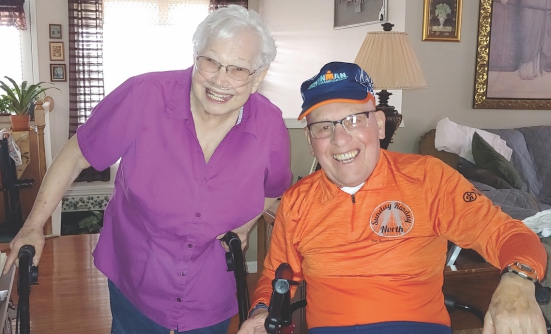As a nurse who works in a major cancer center, my primary goal is to diagnose, treat, and cure patients with cancer. We all hope for a cure, and for the best possible outcome. However, there may be a time when curing the patient’s cancer is no longer possible, and the goal then shifts to treating symptoms and controlling the cancer.
Your Decisions Are Yours to Make
If you have been diagnosed with an incurable cancer, you may be struggling with your decisions. If your first treatment is no longer working, you may be considering new therapy options, or no further treatment, which is not an easy decision to make, and it can be very emotional.
You may feel guilty about not trying any more treatments, because others may think that you are “giving up.” However, these are your individual choices. This is where hope needs to be reframed. The choice to stop active treatment and to focus on living your life in the best way possible for the remaining time may be your new goals.
If this is the situation that you are in, you may have heard the terms “palliative care” and “hospice care.” These models of care provide patients and their families with a focus on quality of life, which will help you live the best life possible in your remaining time.
Benefits of Palliative Care
Palliative care is a medical model of care focused on relieving pain and other symptoms of cancer or the treatment side effects. It focuses on quality of life during treatment and beyond. The goals of palliative care are to improve quality of life at any stage of cancer, regardless of active treatment, and to provide care for the patient’s physical, emotional, social, and spiritual needs.
Research has shown that patients who have palliative care report fewer side effects, have a better quality of life, and are more satisfied with their treatment plan. A study published in 2010 compared patients with metastatic non–small-cell lung cancer who received either standard cancer care or standard care plus palliative care, which focused on pain relief and quality of life.1
The group receiving palliative care reported less depression, anxiety, pain, and nausea, and had better quality of life than the patients receiving standard cancer care. Also, patients in the palliative care group lived 3 months longer than the patients receiving standard treatment, although many declined to have aggressive treatment as their cancer progressed.
Palliative care specialists work with your doctor and others, including nurses, nutritionists, social workers, chaplains, and pharmacists, to create an individual plan to address any treatment side effects, pain, and other concerns, such as family and caregiver needs and planning advance directives.
Why an Advance Directive Is Important
The primary goals of an advance directive are to outline the medical treatment you would want (or not want), and to name a person to make healthcare decisions for you if you are no longer able to express your wishes.
It’s important to understand and to safeguard your wishes by putting them in writing. It can be overwhelming to plan your advance directives. As part of this plan, it’s essential to name a medical or healthcare (or durable) power of attorney who will make your medical decisions for you based on your wishes, if you are no longer able to speak for yourself.
A living will is a written document that allows you to outline which medical treatment you do or don’t want at the end of your life. A living will takes effect only when you are at the end of your life and are no longer able to express your wishes. Sometimes a durable power of attorney and a living will are combined in 1 document.
If you have not thought about an advance directive, you may want to start by considering what’s important in your life, such as:
- What makes you happy to be alive?
- What limitations or circumstances would make your life no longer meaningful?
- What aspects are most important about your quality of life?
- What are your beliefs?
- What do you value the most in life?
It’s also important to understand which medical treatment you prefer. Medical treatment at end of life is defined as life-supporting, life-sustaining, or life-enhancing.
- Life-supportingtreatments include CPR, respirators, and medications that are meant to keep you alive or resuscitate you if your heart or breathing stops
- Life-sustaining care includes tube feedings or providing fluids through an IV line if you can’t eat or drink
- Life-enhancing care is focused on quality of life until natural death occurs, and no active treatment is done to prolong your life. This is often provided through hospice care and may include pain medications, fluids, comfort care, and oxygen
You may also want to discuss a Do Not Resuscitate (DNR) order, which indicates that you do not wish to have CPR if your heart stops.
Make Your Wishes Known
Talk with your family and your care team about your wishes. Remember that everyone has different beliefs and wishes. Your personal wishes are the ones that matter the most as you are planning your advance directive. Planning ahead with advance directives is a beautiful gift that you can give your family as well. They will know exactly how to care for you when you can’t make those decisions yourself.
My hope is that you are living your life in the best way possible with good quality of life, a sense of meaning and purpose, and positive emotional and spiritual well-being.
Reference
- Temel JS, Greer JA, Muzikansky A, et al. Early palliative care for patients with metastatic non–small-cell lung cancer. N Engl J Med. 2010;363:733-742.
Patient Resources
National Cancer Institute Caring Info: State-Specific Advance Directive Forms
www.caringinfo.org
National Hospice and Palliative Care Organization: Advanced Care Planning
www.caringinfo.org/i4a/pages/index.cfm?pageid=3277
Aging with Dignity: Five Wishes Advance Directive
https://agingwithdignity.org/five-wishes
Begin the Conversation: Healthcare Planning
www.begintheconversation.org












